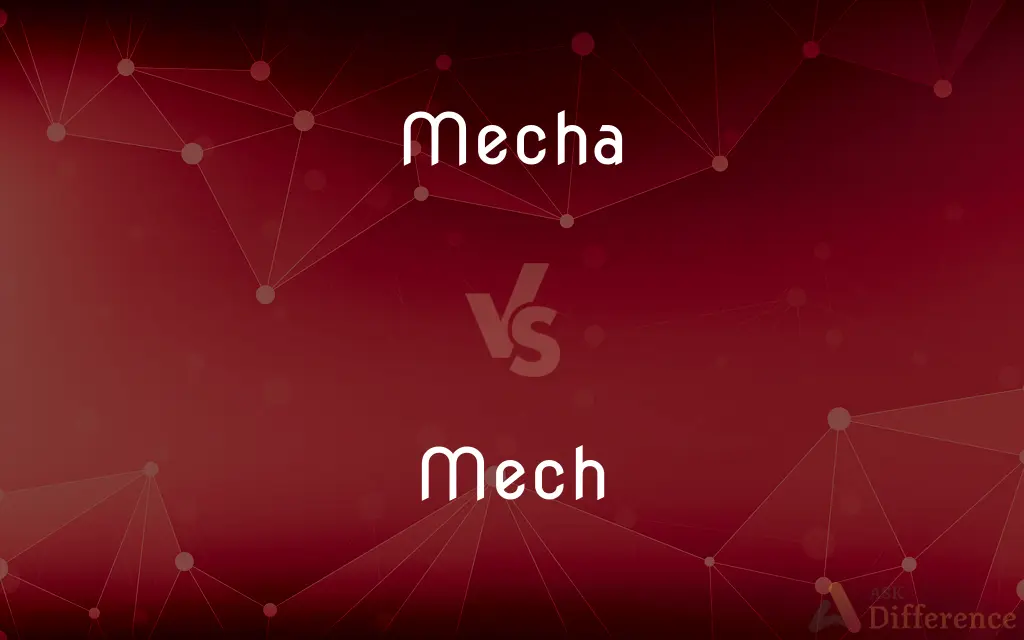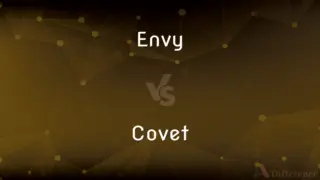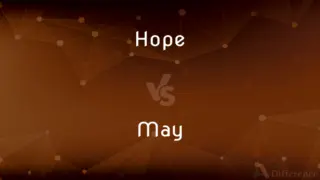Mecha vs. Mech — What's the Difference?
Edited by Tayyaba Rehman — By Maham Liaqat — Updated on April 29, 2024
Mecha typically refers to large piloted robots in science fiction, emphasizing their humanoid form and combat features, while "mech" often serves as a shorthand for the same concept, particularly in gaming contexts.

Difference Between Mecha and Mech
Table of Contents
ADVERTISEMENT
Key Differences
Mecha are large robots, often humanoid, featured primarily in Japanese anime and manga. They are usually piloted by humans and are central to the plot, often used for combat or defense. Whereas mech, which is a shortened form of mecha, is used more broadly in various forms of media including video games and western science fiction, generally carrying the same concept but sometimes implying smaller or less humanoid machines.
Mecha is often depicted with elaborate designs, highlighting its technological sophistication and capabilities. These machines frequently play a pivotal role in their narratives, symbolizing themes of war, technology, and heroism. On the other hand, mechs can be depicted more utilitarian in design and function, used in a wider array of contexts such as military, construction, or other labor-intensive tasks, reflecting a broader interpretation of robotic assistance.
In the realm of anime and manga, mecha is not just a machine; it is often imbued with a significant cultural and emotional weight, integral to character development and plot dynamics. Conversely, in many Western interpretations found in games and novels, mechs might be portrayed as more generic war machines, focusing less on the emotional or cultural significance and more on the tactical and functional aspects.
Mecha narratives typically involve complex relationships between the pilot and the machine, exploring themes of connection, control, and identity. While mech stories, particularly in Western contexts, might emphasize the strategic and combat elements, sometimes exploring man-machine synergy, but often with less emphasis on personal identity.
Mecha series such as "Mobile Suit Gundam" or "Neon Genesis Evangelion" have deep storylines with elaborate world-building and character arcs. Whereas mech appearances in media like the "MechWarrior" video game series often focus more on customization, combat strategies, and multiplayer mechanics, providing a different engagement experience.
ADVERTISEMENT
Comparison Chart
Origin
Primarily Japanese anime and manga
Used globally, often in gaming and Western sci-fi
Design Complexity
High, with attention to detail and symbolism
Varies, often more utilitarian
Usage Context
Central to plot, often symbolic
Broader usage including military and labor
Cultural Significance
Deep cultural and emotional connections
More focused on functionality and strategy
Typical Media
"Mobile Suit Gundam", "Neon Genesis Evangelion"
"MechWarrior" series, various sci-fi novels
Compare with Definitions
Mecha
Large humanoid robot typically featured in anime.
In Mobile Suit Gundam, the mecha are integral to the storyline.
Mech
More commonly associated with Western media.
American sci-fi films frequently feature mechs in battle scenarios.
Mecha
Symbolic of futuristic warfare and heroism.
Each mecha in the series represents a different aspect of heroism.
Mech
Often less symbolically charged than mecha.
In the game, mechs are primarily tools rather than characters.
Mecha
Piloted machines central to narrative themes of technology and identity.
The mecha in Neon Genesis Evangelion explore deep emotional bonds.
Mech
Utilized in a variety of contexts, from combat to construction.
Mechs in this novel are used for planetary colonization tasks.
Mecha
Features elaborate designs that highlight technological advancement.
The intricate design of the mecha emphasizes its cutting-edge technology.
Mech
Shorthand for any robotic machine, often large and humanoid.
The mech in the game is customizable for different combat roles.
Mecha
Often equipped with advanced weaponry and armor.
The mecha's armaments are key to its role in battles.
Mech
Focuses on tactical and strategic use in warfare.
The mech's design is optimized for urban warfare.
Mecha
The term mecha (Japanese: メカ, Hepburn: meka) may refer to both scientific ideas and science-fiction genres that center on giant robots or machines (mechs) controlled by people. Mechas are typically depicted as humanoid walking vehicles.
Mech
(science fiction) A large piloted combat robot.
Mecha
A large armoured robot on legs, typically controlled by a pilot seated inside.
Mech
(science fiction) A robot.
Mech
Abbreviation of mechanic
Mech
Abbreviation of mechanics
Mech
Abbreviation of mechanical
Mech
Abbreviation of mechanized
Common Curiosities
How do mecha and mech influence the storytelling in their respective media?
Mecha often deeply impact the storytelling by integrating themes of heroism and identity, while mech stories might focus more on tactical and combat aspects without deep narrative integration.
Is there a difference in the design complexity between mecha and mech?
Yes, mecha typically feature more elaborate, detailed designs reflecting cultural and thematic significance, whereas mech designs can be more utilitarian and focused on functionality.
Do mecha have a symbolic role in anime?
Yes, in anime, mecha often symbolize more than just mechanical entities; they represent cultural values, emotional depth, and pivotal narrative elements.
Are mecha typically depicted in solo roles or in squads?
Mecha can be depicted in both solo roles and as part of squads, often depending on the narrative needs of the anime or manga.
Are mechs exclusive to Western science fiction?
While mechs are prominent in Western sci-fi, they are also used globally in various media forms including video games and novels.
What are typical settings where mechs appear?
Mechs are typically seen in war zones, futuristic battlefields, and sometimes in industrial or construction settings in various media.
How do the roles of mecha and mech differ in terms of character interaction?
Mecha often form a bond with their pilots, playing a significant role in character development, whereas mechs may not exhibit as deep character interactions.
How does the portrayal of mechs in Western media differ from their Japanese counterparts?
In Western media, mechs are often portrayed more as machines of war or utility without the deep emotional or existential themes commonly found in Japanese mecha narratives.
Can both mecha and mech be used in military applications within their narratives?
Yes, both are often used for military purposes, but mecha are usually central to the plot and thematic exploration, whereas mechs are often tools within a broader tactical context.
What are common features of mechs in video games?
In video games, mechs often feature customizable weapons, armor, and abilities that players can adjust to suit different gameplay styles.
Do mech designs in games influence their functionality?
Yes, in games, the design of a mech often directly influences its functionality, such as speed, strength, and the types of weapons it can carry.
What narrative techniques are used to emphasize the importance of mecha in anime?
Narrative techniques include focusing on the pilot's psychological state, the mecha's impact on the plot, and its interaction with other characters.
What is the typical scale of battles involving mechs and mecha?
Battles involving mecha are often grand in scale, focusing on epic confrontations, while mech battles can vary from large-scale wars to smaller, tactical engagements.
What kind of weaponry is typical for mecha?
Mecha are usually equipped with a variety of advanced weaponry, often including lasers, rockets, and sometimes melee weapons like swords.
How does the audience's perception of mecha and mech differ?
The audience may perceive mecha as more iconic and emotionally engaging due to their narrative depth, whereas mechs might be seen as more versatile and practical in various scenarios.
Share Your Discovery

Previous Comparison
Envy vs. Covet
Next Comparison
Hope vs. MayAuthor Spotlight
Written by
Maham LiaqatEdited by
Tayyaba RehmanTayyaba Rehman is a distinguished writer, currently serving as a primary contributor to askdifference.com. As a researcher in semantics and etymology, Tayyaba's passion for the complexity of languages and their distinctions has found a perfect home on the platform. Tayyaba delves into the intricacies of language, distinguishing between commonly confused words and phrases, thereby providing clarity for readers worldwide.
















































